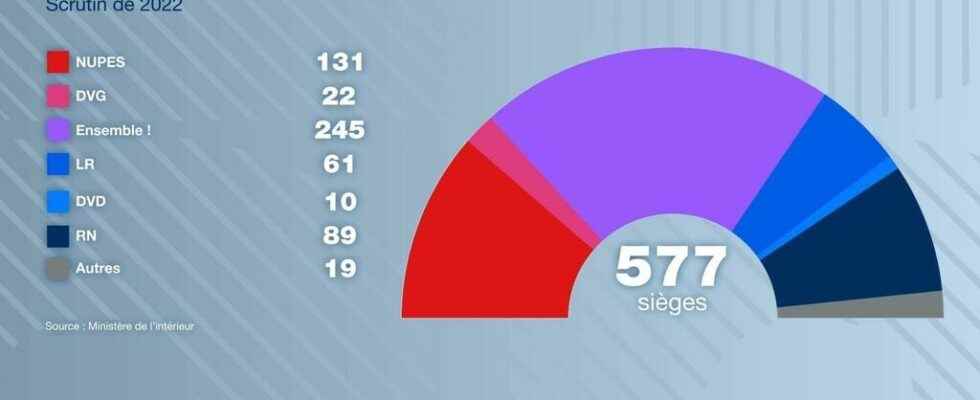The coalition around President Emmanuel Macron does not obtain enough deputies to have an absolute majority in the National Assembly and will have to deal with opposition parties such as Les Républicains, which should be able to count on 76 deputies. Its president, Christian Jacob, nevertheless specifies that the party will remain in opposition. The Nupes, the new coalition of the left, obtains 149 deputies. But the big surprise of this election remains the historic breakthrough of the far right. The National Rally gets more than 85 seats. Another marker of this election: abstention. 54% of voters did not vote. Stéphane Duguet, opinion consultant at the Viavoice Institute, deciphers the situation.
RFI: One lesson from this legislative election is that Emmanuel Macron’s majority is no longer absolute. How will he be able to govern?
Adrian Broche: This is the fundamental issue, especially since we have talked a lot in recent days about the capacity of the majority Together! to hold a majority which is absolute, knowing that the elements of language, it was a strong majority, a solid majority. So obviously, the majority currently is not absolute and not only the majority held today by Ensemble! is not absolute, but it is far from it. Today, Together! is facing an abyss and that is why the question of the participation of LR, of the Republicans, will arise in order to make this country even governable and to be able to apply reforms, especially since Emmanuel Macron was himself elected on the promise of continuity of reforms that could not be put in place. So here, there is also a central issue posed by the question of the majority which is not absolute.
On the left, Jean-Luc Mélenchon will not be Prime Minister, but the score of the new coalition of the left, the Nupes, is higher than all the left parties five years ago.
There are two levels of reading and analysis on this. I think the first is first of all to salute, overall, that the coalition has worked, in any case arithmetically, what it had set itself, that is to say to obtain a number of seats that be consistent, to be the main opposing force, if you can put it that way. The other question which arises, and it is surely a deeper question as well, is what is at stake in the mission of this left. We have seen this for a number of years, and in particular it was the case in the European elections, it was the case in the municipal elections above all, the victories of the left are essentially based on electoral sociologies which are targeted.
They are rather qualified sociologies, rather educated, rather at ease in globalization and in society as it currently functions. So the challenge today, political and intellectual, which I think the Nupes must be confronted with, is to succeed in broadening that to also be the representative of a France perhaps a little more in the background, a a little more out of step with a feeling of ill-being in French society today.
The surprise result is that of the extreme right, the National Rally obtains more than 80 seats, no poll had given them so high. What lesson can we draw from this result?
It’s important, it’s obviously a political group, it means a lot for a National Rally whose parliamentary destiny has long been linked to the question of proportional representation. We knew it and it was often much demanded on the side of activists and sympathizers and politicians of course National Rally, we need more proportionality. In the end, the National Rally did not need that. Which poses, and this is obviously in connection with the question of abstention, such a democratic question to which we will have to find an answer from the side of the parties, let’s say more moderate or republican, as we are used to saying .
Another marker of this election: abstention. 54% of voters did not vote…
I think it’s been pretty underrated, even though it’s been talked about more and more. We are faced with a democratic shortness of breath which poses questions which relatively few parties or partisan coalitions are seizing today.
If we exclude or we obviously put aside the Sixth Republic, proposed for a certain number of years now by Jean-Luc Mélenchon, but which are indeed questions related to the question of proportional representation, to the question of voting remotely, on the issue of compulsory voting as well, we have a certain number of institutional proposals that we will have to put on the table. Questions of participation too, to transform a representative democracy which is effectively today, in some aspects, not all, at the end of its tether. It is also one of the challenges facing, and will face, Emmanuel Macron over this second five-year term. I think he will also be expected at the turn and the results of the election confirm this.
